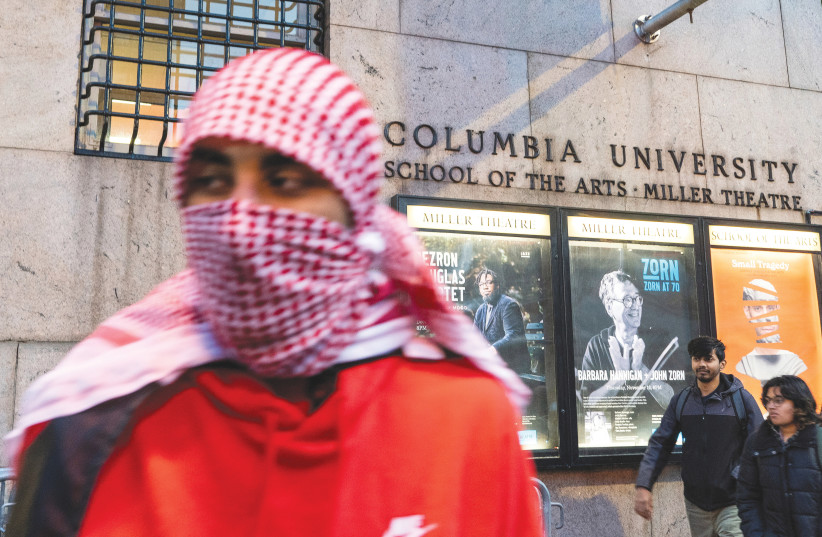The Columbia Jewish Alumni Association (CJAA) penned a letter to Columbia President Nemak (Minouche) Shafik on Friday warning that violence against Jewish students on campus is imminent.
The letter called for Dr. Shafik to take “all possible steps to protect Jewish safety.” This letter comes one day after the mass arrests on Columbia’s campus and two days following the congressional hearing in which Colombia has been charged with not doing enough to protect its Jewish students on campus.
The letter highlighted “unauthorized protests” that they say are “disrupting classes and creating an irrefutably unsafe environment for Jewish students.” Then the letter provided an example, saying, “Within the last 24 hours, for example, protesters assaulted an invited speaker and threatened Jewish students by shouting, ‘We know where you live.’ Immediately outside Columbia’s gates, protesters shouted that ‘October 7 would be every day’ for Jewish students while, on its lawn, protesters called for the destruction of Israel and equated the NYPD and IDF to the KKK.”
The letter claimed that suspended students and some suspended faculty members are actively participating in these protests and are “openly fomenting unrest.” It also claims that those unaffiliated with the university are joining the protests.
CJAA pointed to a petition organized by Jewish students asking for the ability to take their remaining classes online due to fears of violence and intimidation.

CJAA asserted that Columbia is now under “mob rule.” They continue, “A mob – by the way, that is only interested in attention and chaos, rather than thoughtful dialogue or reasoned debate.”
The letter concluded with a call to close Columbia’s gates so that those unaffiliated with the university or those who have been suspended cannot access the campus and can be arrested or removed. The letter says, “The actions of a few should not be allowed to sully the reputation of this esteemed institution nor jeopardize the futures of the students it serves.”
Congressional hearing on Capitol Hill
The congressional hearing on Wednesday brought to light the environment in which Jewish students learn at Columbia University. Several congressmen highlighted professors who celebrated the October 7 attack in the classroom and across social media, including Joseph Andoni Massad, Katherine Franke, and Mohamed Abdou.
When Dr. Shafik was asked how they were penalized, she told Congress that they had been spoken to, and several were under investigation.
Dr. Shafik then divulged that Dr. Massad and Professor Franke were under investigation for making “discriminatory remarks” and said that Dr. Abdou “will never work at Columbia again” for his remarks.
Dr. Massad teaches modern Arab politics and intellectual history at Columbia. He published an article in The Electronic Intifada in October, just after the Hamas attack in Israel, describing it as a “resistance offensive” in retaliation to Israel’s settler colonies near the Gaza border.
At the hearing, Congressman Tim Walberg said that Dr. Massad described the October 7 attacks as “awesome, astonishing, astounding and incredible.” Tim Walberg said that Massad has been saying "these sorts of things" for 20 years.
According to Walberg, a student quietly took off his "Bring Them Home Now" dog tag before entering Massad's classroom so his professor wouldn't see. Waldberg highlights what this student is thinking from the student's point of view as he removes his dog tag to appease a professor, "a professor who holds my academic career in the palm of his hands." He then added sarcastically, "Thats diversity, thats free speech!"
Katherine Franke, a law professor at Columbia, was also mentioned in the hearing for her comment that “all Israeli students who served in the IDF are dangerous and shouldn’t be on campus.”
Regarding Mohamed Abdou, Republican representative Elise Stefanik asked why he was hired even after his social media post on October 11 that proclaimed, “I’m with Hamas & Hezbollah & Islamic Jihad.” In this line of questioning, it was concluded by Stefanik that Columbia needs a stricter vetting process when hiring professors.
Throughout the hearing, it became apparent that although Columbia says chants calling for an intifada and death to Jews are antisemitic, little has been actively done to crack down on protesters, who the University says have a right to free speech. A theme of the university’s testimony at the hearing was the university's efforts to balance free speech and the right to protest while protecting Jewish students’ safety.
According to The New York Times, professors and the American Association of University Professors argued against the congressional hearing. “We are witnessing a new era of McCarthyism where a House committee is using college presidents and professors for political theater,” said Irene Mulvey, national president of the AAUP, The New York Times reported.
She added, “President Shafik’s public naming of professors under investigation to placate a hostile committee sets a dangerous precedent for academic freedom and has echoes of the cowardice often displayed during the McCarthy era.”
Sheldon Pollock, a retired Columbia professor who serves on the executive committee of Columbia’s American Association of University Professors chapter, questioned, “What happened to the idea of academic freedom?”
Another Columbia professor, Rashid Khalidi, was also mentioned at the hearing. He is an Edward Said professor of modern Arab studies, according to Columbia’s website.
At the hearing, Elise Stefanik alleged he was a former Palestinian Liberation Organization (PLO) spokesperson before his career in academia. Khalidi denies his role in the PLO, however he is an author of several books alleging Israel settler-colonialism.
At the hearing Dr. Shafik made an effort to show that she was on top of the issue of antisemitism on campus, however many members of congress argued that not enough disciplinary steps have been taken to squash the anti-Israel and anti-Jewish rhetoric on campus. “You have no action, no disciplinary action,” Stefanik told Dr. Shafik. “Speaking to these professors is not enough. And it’s sending a message across the university that this is tolerated, these antisemitic statements from a person with a position of authority in this classroom is tolerated.”
